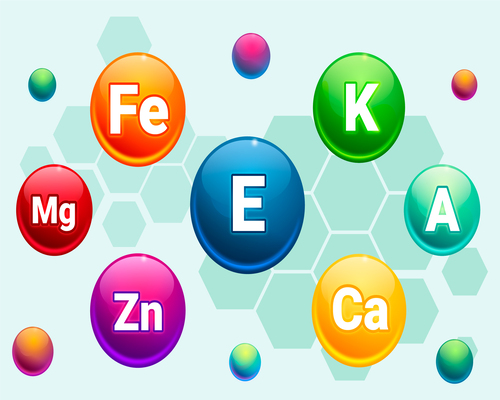- Mineral is the naturally occurring inorganic nutrient found in the soil and food that is essential for the proper functioning of animal and plant bodies. However, their importance is undeniable, as minerals play a pivotal role in maintaining the delicate balance of our bodily functions. From bone health to immune support.
- Mineral is a nutrient that is needed in small amounts to keep the body healthy.
- Minerals are vital elements necessary for the body.
- Minerals are fundamental nutrients that our bodies require for proper functioning. Unlike vitamins, minerals are inorganic elements.
- They can be classified into two main categories: macro minerals, which are needed in larger quantities, and trace minerals, which are required in smaller amounts.
- The mineral (inorganic) elements constitute only a small proportion of the body weight. There is a wide variation in their body content. For instance, calcium constitutes about 2% of body weight while cobalt is about 0.00004%.

General Functions of Minerals
- Build tissue
- Regulates body fluids
- Assist in body function
- Help form body structures
- Formation of Hb-Fe
- Formation of thyroxin-iodine
- Constituent of vit-B12-cobalt
- As a constituent of bones and teeth-Ca, Mg, P.
- As a constituent of soft tissue (liver)- phosphorus
- Minerals perform several vital functions which are essential for the very existence of the organism. These include calcification of bone, blood coagulation, neuromuscular irritability, acid-base equilibrium, fluid balance and osmotic regulation.
- Certain minerals are integral components of biologically important compounds such as haemoglobin (Fe), thyroxine (I), insulin (Zn) and vitamin B12 (Co). Sulfur is present in thiamine, biotin, lipoic acid and coenzyme A. Several minerals participate as cofactors for enzymes in metabolism (e.g. Mg, Mn, Cu, Zn, K). Some elements are essential constituents of certain enzymes (e.g. Co, Mo, Se).
Classification
- Major minerals:
- Also known as macrominerals.
- These are required in amounts greater than 100 mg/day.
- These constitute 60-80% of the body’s inorganic material.
- These are calcium, phosphorus, magnesium, sodium, potassium, chloride and sulphur
2. Trace minerals:
- Also known as microminerals.
- These are required in amounts less than 100 mg/day. They are subdivided into three categories
A: Essential trace elements: Iron, copper, iodine, manganese, zinc, molybdenum, cobalt, fluorine, selenium and chromium
B: Possibly essential trace elements: Nickel, vanadium, cadmium and barium.
C: Non-essential trace elements: Aluminium, lead, mercury, boron, silver, bismuth etc.
A summary of the major characteristics of macroelements
Major functions:
- Constituent of bones and teeth; muscle contraction,nerve transmission.
Deficiency/ disease/symptoms:
- Rickets; osteomalacia, osteoporosis.
Recommended dietary allowance:
- 0.8–1.0 g/d
Major sources:
- Milk and milk products, leafy vegetables, beans.
2. Phosphorus
Major functions:
- Constituent of bones and teeth; in the formation of high energy phosphates,nucleic acids, nucleotide coenzymes.
Deficiency/ disease/symptoms:
- Rickets; osteomalacia.
Recommended dietary allowance:
- 0.8–1.0 g/d
Major sources:
- Milk, cereals, leafy vegetables
3. Magnesium
Major functions:
- Constituent of bones and teeth; cofactor for enzymes e.g. kinases.
Deficiency/ disease/symptoms:
- Neuromuscular weakness, irritation.
Recommended dietary allowance:
- 300–350 mg/d
Major sources:
- Cereals, vegetables, fruits,milk
4. Sodium
Major functions:
- Chief cation of extracellular fluids; acid-base balance,osmotic pressure; nerve and muscle function.
Deficiency/ disease/symptoms:
- Almost unknown on normal diet.
Recommended dietary allowance:
- 5–10 g/d
Major sources:
- Table salt, salt added foods.
5. Potassium
Major functions:
- Chief cation of intracellular fluids; acid-base balance; osmotic pressure; muscle function.
Deficiency/ disease/symptoms:
- Muscular weakness, mental confusion.
Recommended dietary allowance:
- 3–4 g/d
Major sources:
- Fruits, nuts, vegetables.
6. Chlorine
Major functions:
- Regulation of acid-base balance; formation of HCl.
Deficiency/ disease/symptoms:
- Almost unknown on normal diet.
Recommended dietary allowance:
- 5–10 g/d
Major sources:
- Table salt
7. Sulfur
Major functions:
- Constituent of sulfur containing amino acids, certain vitamins (thiamine,biotin) and other compounds (heparin, chondroitin sulfate).
Deficiency/ disease/symptoms:
- Almost unknown.
Recommended dietary allowance:
- There is no specific dietry requirement for sulfur.
Major sources:
- Sulfur containing amino acids


2 thoughts on “Minerals: Difination, Functions and Classification”